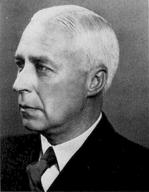Erik Lindahl

photo credits: Wikimedia Commons
Erik Lindahl (21 November 1891 – 6 January 1960) was a Swedish economist. He was professor of economics at Uppsala University 1942–58 and in 1956–59 he was the President of the International Economic Association. He was an also an advisor to the Swedish government and the central bank, and in 1943 was elected as a member of the Royal Swedish Academy of Sciences. Lindahl posed the question of financing public goods in accordance with individual benefits. The quantity of the public good satisfies the requirement that the aggregate marginal benefit equals the marginal cost of providing the good. Lindahl's contributions to economic theory extend beyond his Wicksellian roots to embrace much of what is contained in modern Neo-Walrasian theory. Lindahl's formulation of the concept of sequence economies and intertemporal equilibrium (1929, 1930) is by far the first rigorous attempt to do so. Lindahl's couching of a theory of capital (1929, 1939) in intertemporal terms anticipates Malinvaud's (1953) famous attempt. The transfer of Lindahl's concepts to the anglophone world was accomplished by two of his most ardent supporters, John Hicks (1939, 1965) and Friedrich Hayek (1941). Since then, his work on "sequence analysis" has been given greater emphasis since the work of Frank Hahn (1973) and Roy Radner (1972). Lindahl's 1919 solution to the pricing of public goods is another noticeable achievement, brought into modern economics by Duncan Foley (1970). Source: Wikipedia (en)
Authors influenced by Erik Lindahl 1
Human - wd:Q742722
